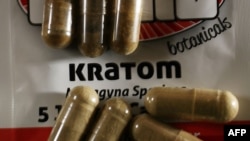Demonstrators gathered Tuesday outside the White House to demand that a natural product from Southeast Asia called kratom be kept legal in the United States.
The substance, the scientific name of which is mitragyna speciosa, is not an opioid, but it contains alkaloids that act on the same brain receptors as drugs like morphine and heroin without producing a high.
The U.S. Centers for Disease Control and Prevention and the U.S. Drug Enforcement Administration have cited an increasing incidence of kratom abuse, and the DEA has announced it will be listed along with heroin and other dangerous drugs on its Schedule I list of illegal substances by the end of this month.
A few days before the White House rally, chief organizer Susan Ash, founder of the American Kratom Association, told VOA she tried the Southeast Asian product after contracting Lyme disease and being prescribed highly addictive painkillers with terrible side effects.
“In a matter of two weeks I went from mostly bed-bound, almost always homebound, only leaving the house to see doctors, to being a productive member of society and so passionate about this issue that I started this organization,” she said.
Tool to fight addictions
Many other kratom advocates have been using the substance to wean themselves off addictions to heroin as well as prescribed opiates. Though there have been some deaths and more than 660 emergency incidents in the United States linked to kratom, there have been tens of thousands of deaths from heroin overdoses, which kratom advocates claim could be avoided if addicts were treated with kratom.
The DEA describes kratom as “a hazard to the public safety,” noting it has been proven to be addictive and its use is spreading.
Dr. Thomas Kosten, a psychiatrist at Baylor College of Medicine in Houston, told VOA that kratom is addictive, but to a lesser extent than heroin, and it is not favored by drug users.
“Kratom does not produce a high,” he said, “but if you put some other things in it, you will in fact get a high.”
Quality control can be an issue in any unregulated substance, and there have been numerous deaths and violent incidents linked to synthetic substances sold as “bath salts,” “Spice” or “Kush.” But Kosten said kratom is seldom cited in drug poisonings.
“There are many thousands of those that occur in a month, even, whereas the misadventures of ingesting kratom have been quite small,” he said.
In cases where kratom has been cited as a factor in a suicide or life-threatening intoxication, there have almost always been other drugs found in the system of the user as well.
Laws focused on protection
Kosten said proper regulation and control of kratom might be better, but he said the DEA has to operate under the laws as they exist, and those laws mainly focus on protecting public health.
“It would be nice if we had a less blunt instrument than the DEA scheduling as a way to control this,” he said.
The DEA’s announcement said kratom “has no currently accepted medical use in treatment in the United States, and has a lack of accepted safety for use under medical supervision."
But the American Kratom Association’s Ash contends the government is removing a relatively safe and inexpensive natural substance that has been used in Asia for thousands of years in favor of expensive, addictive painkillers sold by large pharmaceutical companies.
“They are really restricting our personal liberty to be able to consume dietary supplements and herbals instead of prescription drugs,” she said.
One kratom advocate is a Houston-based natural products distributor who calls himself “Chris Kratom.” He declined to use his real name, but he has stopped selling kratom because of the impending ban.
He used kratom while experiencing pain from a condition that was later relieved by surgery and has felt no need to use it since. But he told VOA many people have benefited from buying kratom in the small stores he supplies.
Those with chronic pain
“The ones who are coming in mostly are people who have been dealing with chronic pain, that don’t want to deal with being lethargic and feeling like a clouded mind after taking their other prescriptions,” he said. “I have seen it firsthand.”
“Chris Kratom” condemns producers who have laced the powdered leaves with other drugs. To ensure the quality of his own products, he traveled with a colleague to Indonesia to visit with his suppliers.
“We sat there and talked with them for several days and tested out their product,” he said.
“Chris Kratom” and Susan Ash, both of whom attended the rally in Washington, favor further study of kratom and hope it will eventually be made legal under the same regulations and consumer protections that govern other products.
Possible product
Meanwhile, university researchers using grants from the National Institutes of Health have succeeded in synthesizing the two main chemicals in kratom, a step that could lead to a regulated, controlled product.
But kratom advocates fear that without competition from the natural substance, the drug company that produces such a product will be able to charge high prices and force many people to seek the substance illegally from questionable suppliers.











